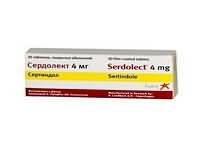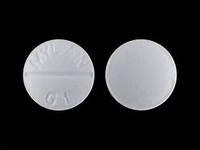sertindole

CLINICAL USE
Atypical antipsychotic:Schizophrenia
DOSE IN NORMAL RENAL FUNCTION
12–20 mg once daily; maximum 24 mg daily
PHARMACOKINETICS
Molecular weight :440.9 %Protein binding :99.5 %Excreted unchanged in urine : <1 Volume of distribution (L/kg) :20half-life – normal/ESRD (hrs) :72 DOSE IN RENAL IMPAIRMENT
GFR (mL/MIN)
20 to 50 : Dose as in normal renal function 10 to 20 : Dose as in normal renal function <10 : Dose as in normal renal function. Start at low dose and increase according to response DOSE IN PATIENTS UNDERGOING RENAL REPLACEMENT THERAPIES
CAPD :Unknown dialysability. Dose as in GFR <10 mL/min HD :Not dialysed. Dose as in GFR <10 mL/minHDF/high flux :Unknown dialysability. Dose as in GFR <10 mL/minCAV/VVHD :Unknown dialysability. Dose as in normal renal function IMPORTANT DRUG INTERACTIONS
Potentially hazardous interactions with other drugs Anaesthetics: enhanced hypotensive effect Analgesics: increased risk of convulsions with tramadol; enhanced hypotensive and sedative effects with opioidsAnti-arrhythmics: increased risk of ventricular arrhythmias with anti-arrhythmics that prolong the QT interval; avoid concomitant use with amiodarone, disopyramide and procainamide (risk of ventricular arrhythmias)Antibacterials: avoid concomitant use with macrolides and moxifloxacin (increased risk of ventricular arrhythmias)Antidepressants: fluoxetine and paroxetine increase sertindole concentration; increased plasma level of tricyclicsAnti-epileptics: antagonises anticonvulsant effect; metabolism accelerated by carbamazepine and phenytoin Antifungals: avoid concomitant use with imidazoles and triazolesAntimalarials: avoid concomitant use with artemether/lumefantrineAntipsychotics: increased risk of ventricular arrhythmias with amisulpride – avoid concomitant useAntivirals: concentration increased by amprenavir, indinavir, lopinavir, nelfinavir, ritonavir and saquinavir (increased risk of ventricular arrhythmias) – avoid concomitant useAnxiolytics and hypnotics: increased sedative effectsBeta-blockers: increased risk of ventricular arrhythmias with sotalolDiuretics increased risk of ventricular arrhythmias due to hypokalaemiaIvabradine: increased risk of ventricular arrhythmias Lithium: increased risk of ventricular arrhythmiasSibutramine: increased risk of CNS toxicity – avoid concomitant use Ulcer-healing drugs: increased risk of ventricular arrhythmias with cimetidine ADMINISTRATION
Reconstition
– Route
Oral Rate of Administration
–Comments
– OTHER INFORMATION
Available on a named patient basis Can cause peripheral oedema Associated with cardiac arrhythmias, QT interval prolongation, and sudden cardiac deathPatients should have an ECG pre and during treatment
Hypokalaemia and hypomagnesaemia should be corrected before starting therapy.
See how to identify renal failure stages according to GFR calculation
See how to diagnose irreversible renal disease
Home









